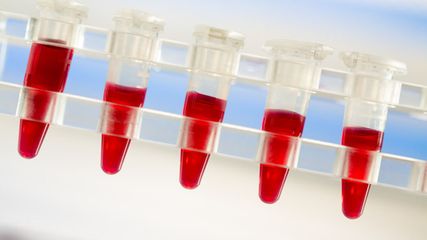
©
Getty Images
Moving towards new treatment standards
Leading Opinions
Autor:
Stephen V. Liu, MD
Associate Professor of Medicine<br> Lombardi Comprehensive Cancer Center<br> Georgetown University<br> Washington DC<br> E-Mail: Stephen.V.Liu@gunet.georgetown.edu
30
Min. Lesezeit
11.07.2019
Weiterempfehlen
<p class="article-intro">SCLC is a rapidly proliferating malignancy of the lung, characterized by early metastatic spread and poor cellular differentiation. Although it is initially highly sensitive to chemotherapy, therapy responses are vastly short-lived. Newly approved immunotherapeutic agents are finally changing the management options of SCLC.</p>
<hr />
<p class="article-content"><p>SCLC is an exceptionally lethal subtype of lung cancer. Characterized by rapid growth and early involvement of distant organs, SCLC is one of the more challenging cancers to manage. Most patients (approximately 70 %) present with extensive stage (ES) disease and the vast majority of those with limited stage (LS) SCLC will unfortunately relapse. For those patients, treatment is palliative in nature and the mainstay of therapy remains platinum- based chemotherapy.</p> <h2>Cisplatin and etoposide initially effective</h2> <p>Chemotherapy is initially effective. Response rates to cisplatin and etoposide exceed 60 % with a notable fraction (about 10 %) achieving a complete response.<sup>1, 2</sup> <br />Responses are not only frequent and potentially deep, they are also relatively rapid, with a median time to response of 4 weeks. Based on response, it may seem as though chemotherapy was a satisfactory treatment. It is not. Responses to chemotherapy are short-lived and the median progression- free survival (PFS) is around 4 months (from initiation of chemotherapy). Upon relapse, SCLC is highly refractory to therapy and survival with chemotherapy alone remains about 9-10 months. <br />Despite these obvious shortcomings, platinum-based chemotherapy has remained the standard of care for decades. Dozens of trials attempting to improve outcomes have repeatedly failed to move the needle. Over the past year, however, that has finally changed with two immunotherapy agents approved for the management of this disease. Immunotherapy, specifically the development of checkpoint inhibitors, has changed our management of SCLC, emerging as standard of care for most patients. It has now become standard in SCLC.</p> <h2>Nivolumab in third-line setting</h2> <p>The anti-PD-1 antibody nivolumab was studied in previously treated SCLC in the CheckMate 032 trial.<sup>3</sup> In this study, patients were assigned, in a non-randomized manner, to one of four arms exploring nivolumab monotherapy and combination therapy with ipilimumab. The response rate to nivolumab was 10 %. Responses increased with the combination, to 19-23, but also increased toxicity, with a higher rate of grade 3 or higher adverse events. A randomized cohort was added, and responses were similar.<sup>4</sup> An analysis of patients who were receiving treatment as third-line therapy (or beyond) was then completed.<sup>5</sup> Among 109 patients, the response rate was 11.9 %. While relatively low, the responses were of high quality, with a median duration of response approaching 18 months. Given the unmet need, nivolumab was granted accelerated approval by the U.S. FDA on August 16, 2018 for patients with metastatic SCLC who had received at least 2 lines of therapy. Unfortunately, there is a high rate of attrition with SCLC. In one study of 432 patients with ES-SCLC, only 22 % of patients received any third line therapy.<sup>6</sup> Earlier implementation of nivolumab could increase potential impact. Efforts thus far have been unsuccessful. CheckMate 331 was a randomized phase III study of patients with SCLC that had recurred or progressed after first line chemotherapy.<sup>7</sup> Patients were randomized 1:1 to receive nivolumab alone or chemotherapy (either topotecan or amrubicin). The trial did not meet its primary endpoint of improved overall survival (OS). Median OS was 7.5 months with nivolumab compared to 8.4 months with chemotherapy and there was no difference in the 1-year survival rate: 37 % vs. 34 %. PFS favored chemotherapy as well. Nivolumab was associated with a PFS of 1.4 months compared to 3.8 months with chemotherapy, hazard ratio (HR) for progression was 1.41 (95 % CI 1.18-1.69). Maintenance therapy was also explored and was also unsuccessful. CheckMate 451 randomized patients with stable disease or response to chemotherapy to receive maintenance nivolumab plus ipilimumab, nivolumab alone or placebo.<sup>8</sup> The combination of nivolumab and ipilimumab failed to improve survival compared to placebo with a median OS of 9.2 vs. 9.6 months and a HR for death of 0.92 (95 % CI 0.8-1.1). The 1-year OS rate was 41 % with nivolumab and ipilimumab and 40 % with placebo.</p> <h2>New standard of care for ES-SCLC</h2> <p>While the activity and approval of nivolumab in the third line setting is encouraging, its failure to improve survival in the second line setting (compared to chemotherapy) or in the maintenance setting (compared to placebo) was disappointing. The greatest opportunity for impact, though, is in the first-line setting and the randomized phase III IMpower 133 trial successfully established a new standard of care for first-line treatment of ES-SCLC. <br />IMpower 133 was a global, randomized, double-blind, phase III trial for patients with treatment-naïve SCLC.<sup>9</sup> Patients received four 21-day cycles of standard carboplatin AUC-5 given on day 1 and etoposide 100 mg/m<sup>2</sup> on days 1-3 and were randomized 1:1 to receive concurrent atezolizumab or placebo. Patients then continued maintenance atezolizumab or placebo until progression or toxicity. The primary endpoints were investigator assessed PFS and OS and the study met both of its endpoints. Median PFS was 5.2 months compared to 4.3 months with placebo (HR 0.77, 95 % CI 0.62-0.96). OS was 12.3 months compared to 10.3 months (HR 0.70, 95 % CI 0.54-0.91). There was no significant difference in toxicity with similar rates of grade 3 or higher adverse events and patients received a median of 4 doses of carboplatin and 12 doses of etoposide (4 full cycles) in both arms suggesting that the addition of atezolizumab did not compromise the ability to deliver 4 full cycles of chemotherapy. This was the first trial in decades to improve overall survival for ESSCLC, rapidly emerging as a new standard of care and approved by the U.S. FDA on March 18, 2019. <br />We now look to build upon this new standard. We expect results from other immunotherapy trials in this setting, including KEYNOTE-604, which explores pembrolizumab with chemotherapy, and CASPIAN, which studies durvalumab with chemotherapy, durvalumab and tremelimumab with chemotherapy, or chemotherapy alone. Other trials will examine the potential contribution of radiation to this paradigm and this may help improve longterm survival for patients with limited-stage SCLC, much the way durvalumab has improved survival after chemoradiation for those with locally advanced NSCLC.</p> <h2>Renewed interest in biomarker discovery</h2> <p>The next major advance, however, will require a biomarker. Novel agents are being developed, including lurbinectedin, poly-ADP ribose polymerase (PARP) inhibitors, check point kinase (CHK) inhibitors and delta-like 3 (DLL3) targeted agents. Biomarkers will be needed to guide the use of these agents as well as to refine use of immunotherapy. At this time, immunotherapy is improving care for a subset of patients with SCLC. Proper identification of that subset will allow physicians to ensure those patients receive immunotherapy early but will also provide insight into why some patients do not respond. With a greater understanding, we can then move toward overcoming primary resistance. <br />Atezolizumab plus carboplatin and etoposide is now a standard of care for ESSCLC after demonstrating superior PFS and OS compared to chemotherapy alone. With a renewed interest in biomarker discovery, the next advance will certainly not take decades to surface. As always, the preferred treatment for anyone with SCLC is a clinical trial, if available, and the greatest impact for this tobacco-related disease will be its prevention; smoking cessation is by far the most important step in improving outcomes in SCLC.</p></p>
<p class="article-footer">
<a class="literatur" data-toggle="collapse" href="#collapseLiteratur" aria-expanded="false" aria-controls="collapseLiteratur" >Literatur</a>
<div class="collapse" id="collapseLiteratur">
<p><strong>1</strong> Roth BJ et al.: Randomized study of cyclophosphamide, doxorubicin, and vincristine versus etoposide and cisplatin versus alternation of these two regimens in extensive small-cell lung cancer: A phase III trial of the southeastern cancer study group. J Clin Oncol 1992; 10: 282-91 <strong>2</strong> Rossi A et al.: Carboplatin- or cisplatin-based chemotherapy in first-line treatment of small-cell lung cancer: The COCIS meta-analysis of individual patient data. J Clin Oncol 2012; 30: 1692-8 <strong>3</strong> Antonia SJ et al.: Nivolumab alone and nivolumab plus ipilimumab in recurrent small-cell lung cancer (CheckMate 032): a multicenter, open-label, phase 1/2 trial. Lancet Oncol 2016; 17 (7): 883-95 <strong>4</strong> Hellmann MD et al.: Nivolmab (nivo) + ipilimumab (ipi) in advanced small-cell lung cancer (SCLC): First report of a randomized expansion cohort from CheckMate 032. ASCO Annual Meeting 2017, abstract 8503 <strong>5</strong> Ready N et al.: Third-line nivolumab monotherapy in recurrent SCLC: CheckMate 032. J Thorac Oncol 2018; 14 (2): 237-44 <strong>6</strong> Steffens CC et al.: Treatment and outcome of 432 patients with extensive- stage small cell lung cancer in first, second and third line – results from the prospective German TLK cohort study. Lung Cancer 2019; 130: 216-25 <strong>7</strong> Reck M et al.: Randomized phase 3 study of nivolumab monotherapy versus chemotherapy in relapsed small cell lung cancer: results from CheckMate 331. ESMO Annual Meeting 2018, abstract 489<strong> 8</strong> Owonikoko TK et al.: Nivolumab plus ipilimumab, nivolumab, or placebo as maintenance therapy in patients with extensive disease small cell lung cancer after first-line platinum-based chemotherapy: results from the double-blind, randomized Phase 3 CheckMate 451 study. European Lung Cancer Congress 2019, abstract LBA1 <strong>9</strong> Horn L et al.: First-line atezolizumab plus chemotherapy in extensive-stage small-cell lung cancer. N Engl J Med 2018; 379 (23): 2220-9</p>
</div>
</p>
Das könnte Sie auch interessieren:
Adjuvantes Osimertinib reduziert ZNS-Rezidive bei EGFR-mutierter Erkrankung
Etwa 30% der Patienten mit nicht kleinzelligem Lungenkarzinom (NSCLC) präsentieren sich mit resezierbarer Erkrankung und werden einer kurativen Operation unterzogen. Viele Patienten ...
Highlights zu Lymphomen
Assoc.Prof. Dr. Thomas Melchardt, PhD zu diesjährigen Highlights des ASCO und EHA im Bereich der Lymphome, darunter die Ergebnisse der Studien SHINE und ECHELON-1
Aktualisierte Ergebnisse für Blinatumomab bei neu diagnostizierten Patienten
Die Ergebnisse der D-ALBA-Studie bestätigen die Chemotherapie-freie Induktions- und Konsolidierungsstrategie bei erwachsenen Patienten mit Ph+ ALL. Mit einer 3-jährigen ...


